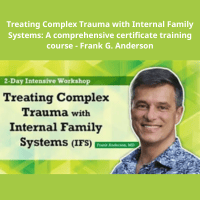Course Summary:
“Treating Complex Trauma with Internal Family Systems: A comprehensive certificate training course” by Frank G. Anderson offers an in-depth and practical exploration of the Internal Family Systems (IFS) model as a highly effective therapeutic approach for individuals struggling with complex trauma. This comprehensive training moves beyond foundational IFS concepts to address the specific challenges and nuances of working with clients who have experienced profound and multifaceted traumatic events. Frank G. Anderson, a leading expert in the field, guides participants through the theoretical underpinnings of IFS, its application in complex trauma cases, and practical strategies for facilitating healing and integration within the client’s internal system. The course emphasizes ethical considerations, therapist self-awareness, and compassionate engagement with the client’s “parts.”
Target Audience:
This program is specifically designed for:
- Mental health professionals (psychologists, psychiatrists, social workers, counselors, therapists).
- Clinicians seeking specialized training in trauma-informed care.
- Practitioners who want to deepen their understanding and application of the Internal Family Systems (IFS) model.
- Therapists working with clients experiencing PTSD, dissociative disorders, attachment trauma, and other forms of complex trauma.
- Professionals looking to earn a certificate in a highly respected therapeutic modality.
Main Content:
The course typically covers key areas such as:
- Foundations of IFS: A review or deeper dive into the core principles of the Internal Family Systems model.
- Understanding Complex Trauma: The neurobiology and psychological impact of complex trauma, including developmental and attachment trauma.
- IFS Application for Trauma: Specific strategies for applying IFS techniques to address the unique challenges presented by complex trauma.
- Working with Protector Parts: Techniques for engaging, understanding, and unburdening extreme protector parts in trauma survivors.
- Accessing and Healing Exiled Parts: Methods for safely accessing and working with “exiled” parts that hold traumatic burdens.
- The Role of Self in Trauma Healing: Strengthening the client’s “Self” (core wisdom and compassion) as the foundation for healing.
- Dissociation and IFS: Understanding and working with dissociative phenomena through the IFS lens.
- Attachment Trauma and IFS: Applying IFS to heal wounds related to early attachment disruptions.
- Therapist’s Self-Energy: The importance of the therapist’s own “Self” in facilitating healing and maintaining boundaries.
- Ethical Considerations and Safety: Ensuring a safe and ethical therapeutic environment when working with trauma.
- Case Conceptualization and Treatment Planning: Developing IFS-informed treatment plans for complex trauma clients.
Master IFS techniques to effectively treat complex trauma!
SIGN UP NOW







